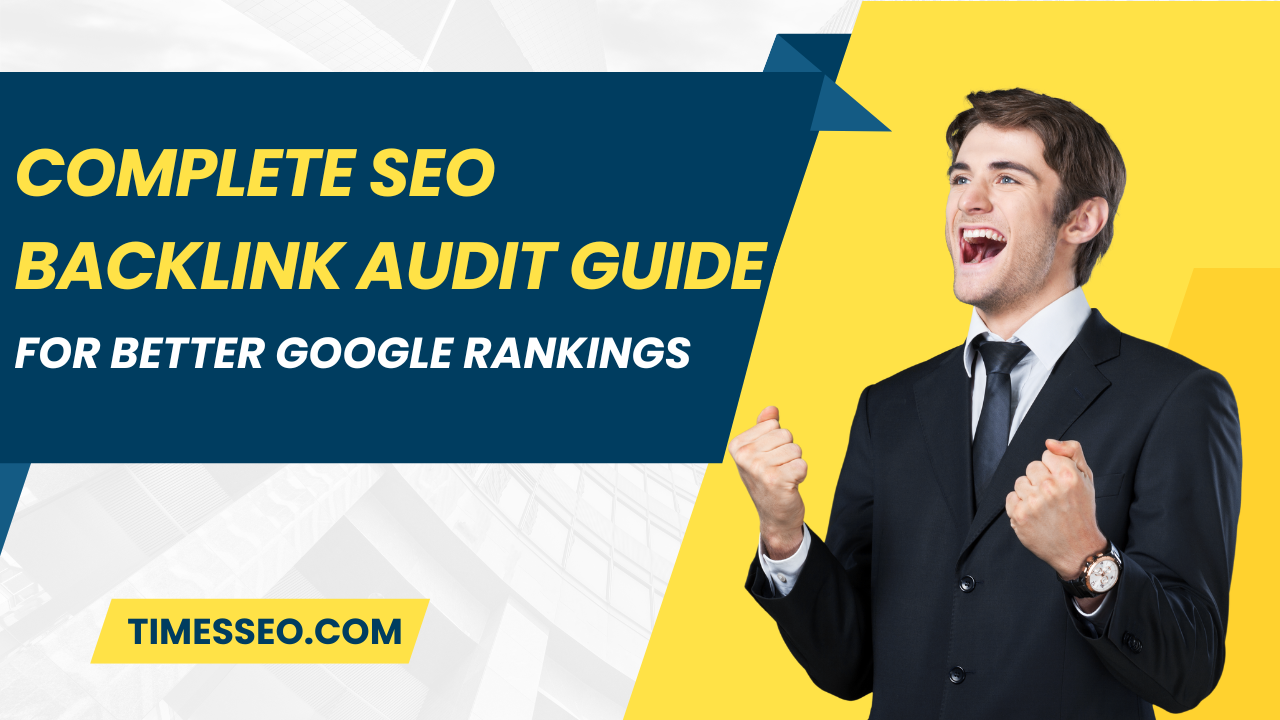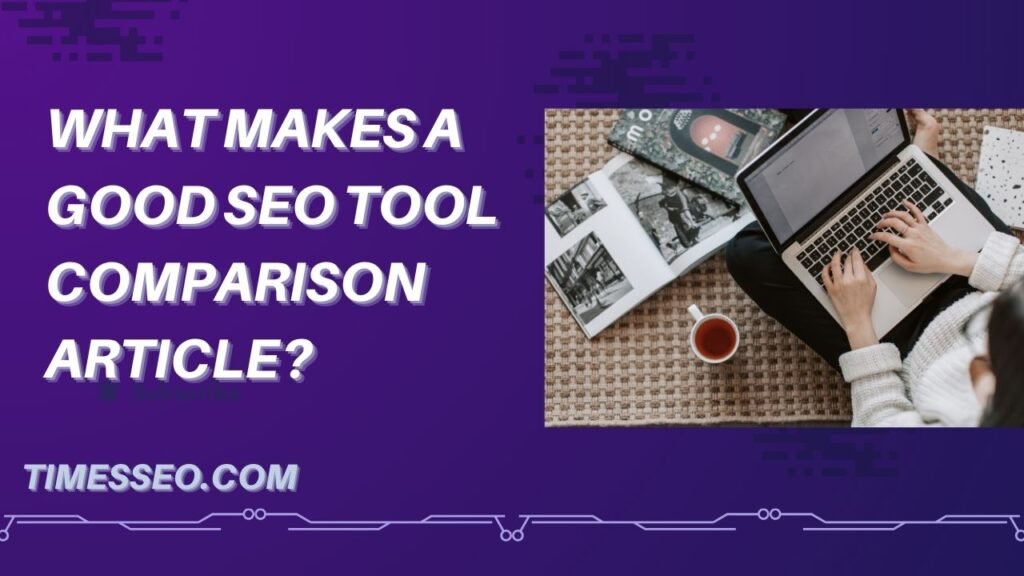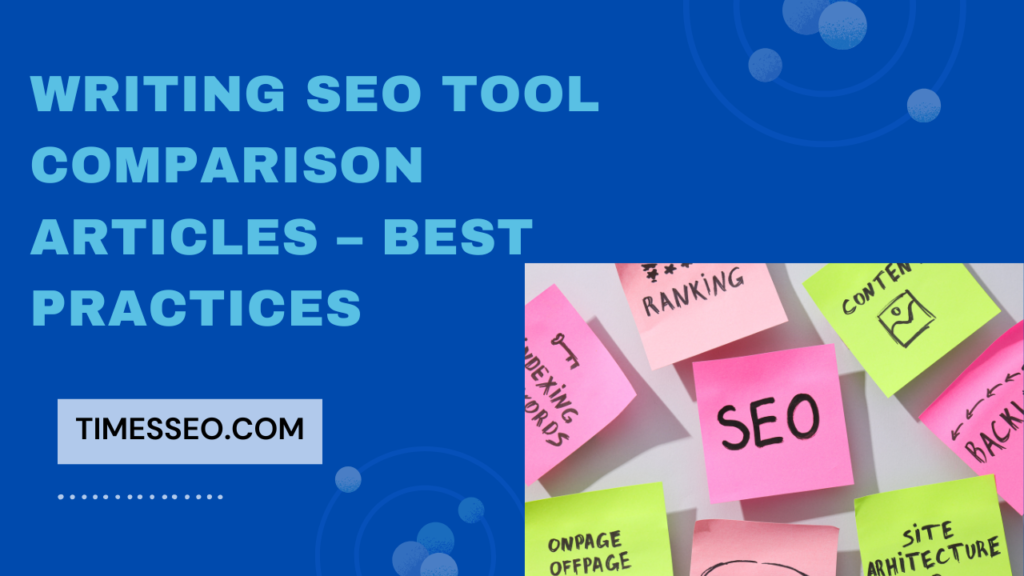
SEO Tool Comparison Articles That Help With Site Audits
Discover how well-crafted SEO tool comparison articles can guide businesses and agencies in choosing the best site audit tools. Learn how to write unbiased, detailed, and engaging comparisons that boost trust, improve SEO, and attract high-intent readers searching for the right solutions.
Table of Contents
Introduction
Why Site Audit Tools Are Essential
SEO is about making sure your website is quick, user-friendly, and healthy, not simply about ranking. Site audits help you uncover hidden issues that could be blocking growth. And when you’re writing about SEO tools, a well-structured comparison article can guide readers to make the right choice.
The Growing Importance of SEO in 2025
Your website must adapt as search engines continue to evolve. As Google introduces AI-powered updates, adhering to technical SEO best practices has become more important than ever.
Why Agencies and Businesses Need Audit Tools
Manual checks are time-consuming. Audit tools automate error detection, making them indispensable for agencies and business owners alike.
What Makes a Good SEO Tool Comparison Article?
Transparency and Objectivity
Readers don’t want fluff—they want facts. A fair comparison shows strengths and weaknesses.
Covering Key Features and Limitations
Don’t just highlight the good. Point out where a tool falls short.
Matching Tools to Different User Needs
A solo blogger doesn’t need the same toolset as a large agency. Match recommendations accordingly.
Core Features of Site Audit Tools to Compare
Technical SEO Checks
Site Speed Analysis
Page load speed directly affects rankings. Tools that provide detailed speed reports are a must.
Mobile Friendliness
With mobile-first indexing, mobile audits are non-negotiable.
Crawl Errors and Indexing
Tools should help detect broken links, duplicate content, and crawl issues.
On-Page SEO Optimization
Keyword Usage and Content Quality
Reviewing keyword density and identifying content gaps can enhance overall optimization.
Meta Tags and Headings Structure
Audit tools ensure title tags, H1s, and descriptions are correctly optimized.
Backlink Analysis and Authority Metrics
Off-page SEO involves evaluating the trustworthiness and overall value of backlinks.
User Experience and Core Web Vitals
Tools that measure LCP, CLS, and FID offer better insights for UX-driven SEO.
Top SEO Tools for Site Audits – A Comparative Look
SEMrush Site Audit Tool
Known for its all-in-one platform, SEMrush offers detailed technical audits.
Ahrefs Site Audit
Strong in backlink analysis with robust crawling capabilities.
Screaming Frog SEO Spider
Technical SEO experts appreciate this highly detailed, desktop-based tool.
Moz Pro Site Audit
User-friendly with actionable suggestions for beginners.
Google Search Console
It’s a valuable free option, though it lacks the capabilities of paid tools.
Sitebulb SEO Audit Tool
Visual reports make it ideal for agencies presenting audits to clients.
Detailed Comparison of SEO Audit Tools
Pricing Structures and Plans
Some tools charge per month; others per crawl. Pick what fits your budget.
Ease of Use and Learning Curve
Screaming Frog requires advanced know-how, whereas Google Search Console is beginner-friendly.
Accuracy of Reports and Data Reliability
Premium tools often provide deeper data, but GSC is the most reliable source straight from Google.
Integrations With Other Tools
Look for integrations with Google Analytics, Data Studio, or Slack for seamless workflows.
Best for Agencies vs. Best for Small Businesses
Agencies may prefer SEMrush or Ahrefs, while small businesses benefit from Moz Pro or GSC.
Writing SEO Tool Comparison Articles – Best Practices
Be Honest About Pros and Cons
Readers appreciate unbiased breakdowns.
Use Real Examples and Screenshots
Showing actual dashboards makes reviews more trustworthy.
Add Comparison Tables and Visuals
Tables help readers compare tools at a glance.
Provide Actionable Recommendations
Don’t just list tools—guide readers to the best choice.
How SEO Tool Comparison Articles Help Readers
Helping Agencies Decide Faster
Agencies save time by quickly identifying the right tool for their workflow.
Saving Businesses From Wasting Budgets
A fair comparison prevents costly trial-and-error.
Building Trust With Transparency
Readers are more inclined to come back when they believe your comparisons.
Optimizing Tool Comparison Articles for SEO
Targeting “Tool vs Tool” Keywords
Searches like “Ahrefs vs SEMrush” drive high-intent traffic.
Writing Engaging Meta Titles and Descriptions
Make sure your snippets promise value and clarity.
Using Structured Data for Product Comparisons
Schema markup increases visibility in SERPs with star ratings and rich snippets.
Common Mistakes in SEO Tool Comparison Articles
Being Too Biased Toward One Tool
Readers spot bias instantly—it reduces credibility.
Focusing Only on Features Without Use Cases
Features matter, but showing how they help is even better.
Outdated Information and Missing Updates
SEO tools change often—keep your comparisons current.
Conclusion
SEO tool comparison articles are more than reviews—they’re roadmaps for making smarter business decisions. When written with honesty, clarity, and real-world insights, they become valuable resources that build trust and authority.
Frequently Asked Questions
Google Search Console and Moz Pro are beginner-friendly.
Google Search Console provides the most reliable data since it comes directly from Google.
Yes, but alternatives like Moz Pro or Sitebulb may be more budget-friendly.
Often, yes—using multiple tools provides more complete insights.
At least once a month, but weekly for larger or frequently updated sites.
Table of Contents
Popular Posts
-
 Affordable Technical SEO Audit for Small Business: A Complete Guide26 Jun 2025 Blog
Affordable Technical SEO Audit for Small Business: A Complete Guide26 Jun 2025 Blog -
 How to Get an Affordable Technical SEO Audit for Small Business27 Jun 2025 Blog
How to Get an Affordable Technical SEO Audit for Small Business27 Jun 2025 Blog -
 The Ultimate Local SEO Audit Checklist for Startups28 Jun 2025 Blog
The Ultimate Local SEO Audit Checklist for Startups28 Jun 2025 Blog -
 Local SEO Audit Checklist for Startups: A Beginner’s Guide28 Jun 2025 Blog
Local SEO Audit Checklist for Startups: A Beginner’s Guide28 Jun 2025 Blog -
 Top On-Page SEO Audit Steps for Service Websites Every Business Should Know29 Jun 2025 Blog
Top On-Page SEO Audit Steps for Service Websites Every Business Should Know29 Jun 2025 Blog -
 Technical SEO for WordPress: The Ultimate Beginner’s Guide01 Jul 2025 Blog
Technical SEO for WordPress: The Ultimate Beginner’s Guide01 Jul 2025 Blog -
 The Impact of On-Page SEO Audit Steps for Service Websites on UX01 Jul 2025 Blog
The Impact of On-Page SEO Audit Steps for Service Websites on UX01 Jul 2025 Blog -
 Technical Mobile SEO Audit Tips for Developers02 Jul 2025 Blog
Technical Mobile SEO Audit Tips for Developers02 Jul 2025 Blog -
 Complete SEO Backlink Audit Guide for Better Google Rankings03 Jul 2025 Blog
Complete SEO Backlink Audit Guide for Better Google Rankings03 Jul 2025 Blog -
 Boost Your Rankings with Technical SEO for WordPress01 Jul 2025 Blog
Boost Your Rankings with Technical SEO for WordPress01 Jul 2025 Blog







